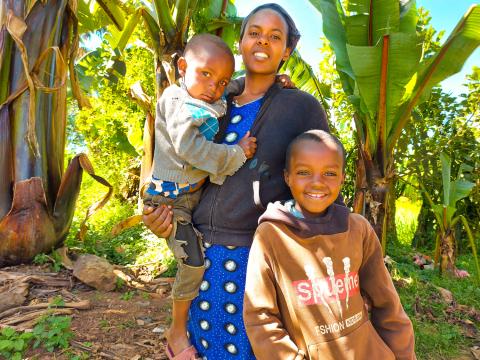Saving Transforms Households’ Future

Saving is an essential tool for increasing household income. However, many assume that saving is made from “leftover” money one has after a great deal of spending. Awareness creation and capacity-building training are important tools that can change this tendency. When a saving culture becomes an asset for the community, wealth increases, livelihoods improve, and children become educated, healthy, cared for, and protected.
The community in Hula District, in Sidama Region, 304 miles (365 kilometres) South of the capital city of Ethiopia, Addis Ababa, used to live out in such social tendency. World Vision Ethiopia, through its integrated livelihood project model called "Saving for Transformation" aims to work with the communities to introduce and support the adoption of a saving culture, to support saving group formation, and to offer financial literacy training on saving, credit, loan repayment, and sharing.
 Tadelech Yade, 26, a mother of two, shares her experience "I was a housewife who used to sell the vegetables I produced in my garden to make a living. I also did a small size poultry farming.” she would made USD 3 a week or around USD 12 a month. She confesses that she would spend all her earnings because she did not know anything about saving. “I spent all my income buying commodities. I did them out-of-plan,’’ says Tadelech. She could neither feed her children nutritious meals nor cover medical expenses when her child got sick.
Tadelech Yade, 26, a mother of two, shares her experience "I was a housewife who used to sell the vegetables I produced in my garden to make a living. I also did a small size poultry farming.” she would made USD 3 a week or around USD 12 a month. She confesses that she would spend all her earnings because she did not know anything about saving. “I spent all my income buying commodities. I did them out-of-plan,’’ says Tadelech. She could neither feed her children nutritious meals nor cover medical expenses when her child got sick.
She became a member of the already established Latisha Woman’s Saving Credit Group in Kankicha Village and was oriented to saving, loan repayment, and doing a small business. Soon she opened a rural mini-shop and began trading in a physical market. Accordingly, the livelihood status of her household has improved with increased agricultural production and financial management. Tadelech says, "The training that World Vision offered has changed my way of life. I took a $4,000 microloan in 2019 from the savings group and opened a mini shop. I was engaged in micro business and made profits for the first time. I paid back the loan only one year later. The training was eye-opening for me." Her business grew faster than she expected so she bought three dairy cows and a piece of land for cultivation. She is a self-sufficient woman in the village now. ‘‘Now, I can feed my children a variety of foods three times a day. I also can support my child's education,” Tadelech says happily.
Tadelech says, "The training that World Vision offered has changed my way of life. I took a $4,000 microloan in 2019 from the savings group and opened a mini shop. I was engaged in micro business and made profits for the first time. I paid back the loan only one year later. The training was eye-opening for me." Her business grew faster than she expected so she bought three dairy cows and a piece of land for cultivation. She is a self-sufficient woman in the village now. ‘‘Now, I can feed my children a variety of foods three times a day. I also can support my child's education,” Tadelech says happily.
Following the training, World Vision provided a saving box, registration book, stamp, passbook, money collection tray, and pens to the women’s group. Over 3,950 Hula district women who participate in the Saving and Credit Group in their respective villages have received skill training. Tadelech believes that World Vision helped her explore her potential and taught her how to feed her children. She says, “Now I live a different lifestyle and the training content includes not only financial and business management but also time management. Now, I use my time wisely. I sincerely thank World Vision for the great support it has provided."
By Hilina Hailu, Communications Coordinator, World Vision Ethiopia